Compare Lenders
Discover Popular Financial Services
Quick Links
In this article we cover:
- Business credit card basics
- Eligibility requirements for business credit cards
- Types of business credit card
- Characteristics of business credit cards
- How to compare business credit cards
- How to apply for a business credit card
- Pros and cons of business credit cards
- An extensive review of available Canadian business credit cards
- FAQ
Let's get started!
1. Business Credit Card Basics
What Is a Business Credit Card?
It's simple really - a business credit card is a credit card issued to and used by a business, for business expenses. Aside from being issued to a business for business expenses, rather than an individual for personal expenses, a business credit card is just like a personal credit card. It's essentially a revolving business line of credit that can be used, paid off, and used again, for any purchase. It has eligibility requirements, a cost associated with its use, and different cards offer different perks to their users.
Why Are Business Credit Cards Useful?
Users
The above is all true for businesses large and small, but a significant perk for larger businesses is the ability to have multiple authorized users for a business credit card - often without any additional cost. This means that if employees are routinely incurring expenses on behalf of the business, they can use the business's credit card to do so, thereby eliminating the need for expenses repayment (and all of the admin that goes into an expenses program), and still allowing for expenses tracking. Again, this is just a simpler solution for everyone involved than each employee using their personal credit card.
Credit
Another reason business credit cards are useful is that they help a company establish a credit history, and so over time increase their borrowing potential, via larger loans, commercial mortgages and business lines of credit. A business credit card is a great starting place for new businesses seeking entry into the borrowing market, and it's important to note that the credit limit for business cards is usually higher from the start than for personal cards. And, just like with personal credit cards, a business credit card allows businesses to purchase the things they need immediately, while giving the business owner time to pay for it.
Simplicity
There are some significant benefits to using a business credit card (covered more in depth in our section on pros and cons, below), but in short the majority of people who choose to get a business card for their business do so because they want to separate their business expenses and needs from everything else. It's simply easier from a tracking and accounting perspective to have a separate card tied to a business that handles all of the business's needs.
2. Eligibility Requirements for Business Credit Cards
Who Can Get a Business Credit Card in Canada?
To get a business credit card in Canada, there are a few basic requirements. The cardholder must be legally resident in Canada. The business must be for-profit, and actively operating in Canada. It doesn't have to be a registered business (a sole proprietorship can go unregistered and still get a business credit card); all that issuers really care about is that the business has cash flow and the cardholder will pay off the card's balance over time. So an individual running their own business and working for themselves can get a business credit card.
In addition, a business cannot deal in prohibited goods or engage in anything illegal to qualify, and there may be specific industry or country restrictions in place.
What About Credit Score?
The above covers the basics, but most issuers have additional criteria relating to the applicant's ability to pay off the card. This includes business income and/or assets, cash flow, personal income, household income, and credit score.
Not every business will have an established credit history, so some card issuers look at the prospective cardholder's personal credit score, rather than the business's credit. Other issuers will look at the business's credit, and this is especially true for larger businesses with potentially multiple card users or high credit limits.
In general though, a good to excellent credit score is needed to secure the best business credit cards. Those who have a past bankruptcy, either professionally or personally, will in particular struggle to access this type of financial instrument.
3. Types of Business Credit Card
There are two major types of business credit card:
Small Business Credit Cards
Small business credit cards are very similar to personal credit cards, and are in general used by small business owners who complete the application, manage the card, and pay off its balance themselves.
Many cards in this space offer rewards aimed at making the life of the business owner easier - for example, offering expense tracking software with the card, or providing cash back or statement credits for business expenses charged to the card (such as office supplies or internet bill payments).
The credit limit on this type of card is generally smaller than with corporate credit cards (discussed below), and typically allow for only a small number of additional cardholders. All of this combines to make these cards ideal for small to medium sized businesses looking to optimize their expense management and simplify their accounting.
Corporate Credit Cards
Corporate credit cards, on the other hand, are intended for big businesses, and a business must be a registered corporation to qualify. These cards offer much higher credit limits, allow for more users, and typically offer competitive rewards programs that the company will reap the benefit of, rather than the cardholder.
The company responsible for the card, rather than the authorized cardholder, is accountable for paying off the card and covering its fees and interest payments. So all in all, corporate credit cards are relevant to large businesses with multiple employees routinely incurring business expenses.
4. Characteristics of Business Credit Cards
Eligibility Requirements
As mentioned above, business credit cards have eligibility requirements, just as personal credit cards do. These eligibility requirements can differ quite a bit between issuers - for example, some have a minimum income requirement, others don't - so it's always important to look at each issuer's terms and conditions as a starting point.
The best business credit cards will have more requirements than those that offer fewer benefits.
The good news is that even new and small businesses can qualify for a business card, as in many cases the personal credit history of the cardholder will be taken into account.
Interest Rates
The interest rate you pay on your credit card will be a defining factor in its affordability - especially if you tend to carry balances over; most business credit cards charge differing rates for purchases, balance transfers and cash advances, and these rates can range from 12% to 30%.
It's important to find a card that you can afford to use, so always check the differing rates applicable on a card before you apply. Not every dollar spent will be charged interest in the same way!
Annual Fees
Just like with many personal credit cards, you'll probably have to pay for your business credit card. Annual fees for cards can vary from $0 to many hundreds of dollars, so this is also an important comparison point when shopping around. Some cards offer annual fee rebates, likely issued as statement credits.
Other Fees
You'll also typically experience fees for actions such as:
- Making or receiving payments in a foreign currency
- Transferring balances from other cards
- Using the card for cash advances
If these actions are a common occurrence in your business, there are some cards that offer lower or waived fees in these areas, to help you save money.
Credit Limit
A card's credit limit can define how your business is able to use the card, and issuers will take into account your business's financial position when determining an appropriate credit limit. Smaller and newer companies tend to have lower limits - but these are still higher than with your typical personal card.
As each issuer uses their own formulae to calculate how much credit to offer, this is an area when you can absolutely shop around.
Rewards and Benefits
Business credit cards tend to have more lucrative rewards programs than personal credit cards, and these can quickly become very impactful. To find the program that'll be the most productive for you, consider what kind of card purchases you'll make, and look for a card that offers a high rewards earn rate for each dollar spent in that category (e.g. travel purchases).
In addition, look at the benefits that come with the card as standard, unrelated to each dollar spent. A good example is insurance; many travel-related business credit cards include extensive travel insurance coverage, and it is applicable regardless of how many rewards points you have.
5. How To Compare Business Credit Cards
Finding the best business credit card can be simple, even with all of the different options available, if you answer the following questions:
The key to choosing the best business credit card is understanding your expected use of it - all else flows from this.
6. How To Apply for a Business Credit Card
Applying for a business credit card is neither difficult nor complicated, with many issuers offering easy online applications for convenience. All you have to do is follow these steps:
- Understand what's needed. Each issuer has slightly different requirements, so take a look at what you'll be asked for (such as proof of income, business registration documents, and so on) and make sure you have these items.
- Gather your paperwork. Bring all of the needed information and documents together to make your application as simple as possible.
- Begin your application. Answer every question in the application form as honestly as you can, making sure to upload your supporting documents wherever they are asked for. Double check your answers before moving on.
- Submit. Once you've provided all of the required information, submit your application and wait! Most applicants can expect to hear back from an online application within a few days.
7. Pros and Cons of Business Credit Cards
Pros
- Easier tracking of business expenses
- Separation of personal and business expenses (and therefore less administration)
- Separation of personal and business credit
- Ability to build business credit history
- Ability to have multiple authorized users
- More robust fraud protection
- Better rewards and perks
- Higher credit limits
Cons
- Employees with cards may have access to unchecked spending
- Interest charges and fees can be higher
- Possible damage to business credit if balances go unpaid
8. The Current Canadian Card Market
Now we understand how to evaluate the best business credit cards in Canada, let's look at all of the options. First up, a quick review of the marketplace can be seen in the table below. This shows all of the major cards and their terms.
| Credit Card | Annual Fee | Welcome Bonus | Interest Rates (Purchases/Cash Advances) | Features | Associated Brand | Fees for Additional Cards | Credit Needed | Instant Approval? | Income Eligibility Requirements? | Travel Insurance Included? | Mobile Device Insurance Included? | Rewards Program? | How To Earn Rewards |
|---|---|---|---|---|---|---|---|---|---|---|---|---|---|
| American Express Aeroplan Business Reserve Card | $599 | Up to 120,000 Aeroplan Points | 19.99%/21.99% | Premium travel benefits | Aeroplan | $0 | 660+ | Y | N | Y | N | Y | 3x points for every $1 spent on eligible purchases made directly with Air Canada 2x points for every $1 spent on eligible hotels and car rentals 1.25x points for every $1 spent on everything else |
| American Express Business Edge Card | $99 | Up to 67,000 Points | 20.99%/21.99% | Flexible points usage | none | $0 | 660+ | Y | N | Y | N | Y | 10x points for every $1 spent on eligible business essentials including office supplies & electronics, rides & gas, eats & drinks within the first 6 months 3x points for every $1 spent on office supplies & electronics, rides & gas, eats & drinks when Welcome Offer ends 1x points for every $1 spent on everything else |
| American Express Business Gold Rewards Card | $199 | Up to 70,000 Points | 20.99%/30% | Perks for business travellers | none | $50 | 660+ | Y | N | Y | Y | Y | 10,000 points each quarter when you charge $20,000 to your card 1x points on $1 spent on everything else |
| American Express Business Platinum Card | $499 | Up to 90,000 Points | 20.99%/30% | Point transfers | none | $199 | 660+ | Y | N | Y | N | Y | 1.25x points for every $1 spent on everything |
| BMO Air Miles No-Fee Business Mastercard | $0 | 1,000 Air Miles | 19.99%/22.99% | Air Miles points and no fee | Air Miles | $0 | 660+ | Y | N | N | N | Y | 1 Air Miles Reward Mile on every $20 you spend 1.25 Air Miles for every $20 spent at participating Shell stations |
| BMO Air Miles World Elite Business Mastercard | $149 | Up to 70,000 BMO points | 17.99%/22.99% | Air Miles points | Air Miles | $50 | 760+ | Y | Y | Y | N | Y | 4x points on every $1 spent on gas, office supplies, cell phone and internet bill payments 1.5x points on every $1 spent on everything else |
| BMO CashBack Business Mastercard | $0 | Up to $150 | 19.99%/22.99% | Cashback on gas expenses | none | $50 | 660+ | Y | N | N | N | Y | 1.5% cash back on eligible gas stations, office supplies purchases and on cell phone and internet recurring payments 1.75% cash back on purchases at Shell gas stations 0.75% cash back on all other card purchases |
| Caary Business Mastercard | $0 | none | variable | Easily accessible | none | $0 | none | Y | Y | N | N | Y | 1% cashback on all purchases |
| CIBC Aeroplan Visa Business Card | $180 | Up to 60,000 Aeroplan Points | 12.99%-21.5% | Everyday business expenses | Aeroplan | $50 | 760+ | Y | Y | Y | N | Y | 2x points per $1 spent with Air Canada 1.5x points per $1 spent on shipping, cable, internet, phone services, travel and dining 1x points per $1 spent on everything else |
| CIBC Aeroplan Visa Business Plus Card | $120 | Up to 60,000 Aeroplan Points | 19.99%/22.99% | Air Canada perks | Aeroplan | $50 | 760+ | Y | Y | Y | N | Y | 2x points per $1 spent with Air Canada 1.5x points per $1 spent on shipping, cable, internet, phone services, travel and dining 1x points per $1 spent on everything else |
| CIBC Aventura Visa Card for Business | $120 | Up to 60,000 Aventura points | 19.99%/21.99% | Statement credits | none | $50 | 760+ | Y | Y | Y | N | Y | 2x points for every $1 spent on all travel purchases made through the CIBC Rewards Centre 1.5x points for every $1 spent on gas, electric vehicle charging, transit and travel spending 1x points for every $1 spent on everything else |
| CIBC Aventura Visa Card for Business Plus | $120 | Up to 60,000 Aventura points | 19.99%/22.99% | Pooling points | none | $50 | 760+ | Y | Y | Y | N | Y | 2x points for every $1 spent on all travel purchases made through the CIBC Rewards Centre 1.5x points for every $1 spent on gas, electric vehicle charging, transit and travel spending 1x points for every $1 spent on everything else |
| CIBC Bizline Visa Card for Small Business | $0 | none | 8.45%-19.95% | Low interest | none | $0 | 760+ | Y | Y | Y | N | N | None |
| Desjardins Visa Business Credit Card | $60 | none | 15.45% | Low interest | none | $60 | 760+ | Y | N | Y | N | Y | 1% cash back on all purchases between $12,000 and $500,000 spent annually |
| Desjardins Visa US Business card | $30 USD | none | 19.40% | USD transactions | none | $30 | 760+ | Y | N | Y | N | N | None |
| Loop Corporate Card | $0 | none | 2.99% | Multi-currency transactions | none | $0 | 660+ | Y | N | N | N | N | None |
| Float Visa Card | $0 | Up to $500 | n/a | Pre-paid | none | $0 | none | Y | N | N | N | Y | 1% cashback on every $1 spent |
| Marriott Bonvoy Business American Express Card | $150 | Up to 85,000 Points | 20.99%/21.99% | Hotel rewards | Marriott | $50 | 560+ | Y | N | Y | Y | Y | 5x points for every $1 spent at participating Marriott Bonvoy hotels 3x points for every $1 spent on eligible gas, dining and travel 2x points for every $1 spent on everything else |
| Meridian Visa Infinite Business Cash Back Plus Card | $110 | none | 19.50% | Credit union | none | $0 | Not specified | Y | N | Y | Y | Y | 1.5% unlimited cash back on all purchases 3% unlimited cash back on net purchases in foreign currencies |
| RBC Avion Visa Infinite Business | $175 | Up to 25,000 Points | 20.99%/22.99% | Avion points | Avion | $75 | 760+ | N | Y | Y | Y | Y | 1.25x points for every $1 spent in net purchases on up to $75,000 every year 1x points for every $1 spent after that |
| RBC Business Cash Back Mastercard | $0 | none | 20.99%/22.99% | Cashback | none | $0 | 760+ | N | N | N | N | Y | 2% cash back on purchases made in the first three months 1% cash back on purchases made after three months (up to an annual limit of $650) |
| Scotia Momentum for Business Visa Card | $79 | 2.99% interest on balance transfers for 6 months | 19.99%/22.99% | Balance transfers | none | $29 | 760+ | N | N | Y | N | Y | 3% cash back on recurring bill payments and eligible gas station, restaurant and office supply store purchases (up to a maximum spend of $50,000) 1% cash back on all purchases after $50,000 |
| Scotiabank Passport Visa Infinite Business Card | $199 | Up to 30,000 Scene points | 19.99%/22.99% | No foreign transaction fees | Scene | $0 | 760+ | Y | Y | Y | N | Y | 1.5 Scene points for every $1 spent |
| TD Aeroplan Visa Business Card | $149 | Up to 50,000 Points | 14.99%/22.99% | Travel perks | Aeroplan | $49 | Not specified | Y | N | Y | Y | Y | 2x Aeroplan points for every $1 spent on eligible purchases made directly with Air Canada 1.5x Aeroplan points for every $1 spent on eligible travel, dining and select business categories, such as shipping, internet, cable and phone services 1x Aeroplan point for every $1 spent on all other eligible purchases |
| TD Business Travel Visa Card | $149 | Up to 140,000 Points | 19.99%/22.99% | Earning points on travel | none | $49 | Not specified | Y | N | Y | N | Y | 9x points when you book travel online through ExpediaForTD.com using your Card 6x points for every dollar spent on foreign currency purchases, restaurant purchases and regularly recurring bill payments up to a maximum annual spend of $80,000 2x points per $1 spent after that |
Quick Review: The Best Business Credit Card for...
There's a lot of information in the above table, so let's take a closer look at the available Canadian business credit cards in several key areas, crucially looking at how they compare to each other:
Rewards Points
This table shows each of the available cards and how they earn points with each dollar spent, with the card that most easily earns points ranked at number 1:
| Rank | Credit Card | Welcome Bonus | Points Earning |
|---|---|---|---|
| 1 | American Express Business Edge Card | Up to 67,000 Points | 10x points for every $1 spent on eligible business essentials including office supplies & electronics, rides & gas, eats & drinks within the first 6 months 3x points for every $1 spent on office supplies & electronics, rides & gas, eats & drinks when Welcome Offer ends 1x points for every $1 spent on everything else |
| 2 | TD Business Travel Visa Card | Up to 140,000 Points | 9x points when you book travel online through ExpediaForTD.com using your Card 6x points for every dollar spent on foreign currency purchases, restaurant purchases and regularly recurring bill payments up to a maximum annual spend of $80,000 2x points per $1 spent after that |
| 3 | Marriott Bonvoy Business American Express Card | Up to 85,000 Points | 5x points for every $1 spent at participating Marriott Bonvoy hotels 3x points for every $1 spent on eligible gas, dining and travel 2x points for every $1 spent on everything else |
| 4 | BMO Air Miles World Elite Business Mastercard | Up to 70,000 BMO points | 4x points on every $1 spent on gas, office supplies, cell phone and internet bill payments 1.5x points on every $1 spent on everything else |
| 5 | American Express Aeroplan Business Reserve Card | Up to 120,000 Aeroplan Points | 3x points for every $1 spent on eligible purchases made directly with Air Canada 2x points for every $1 spent on eligible hotels and car rentals 1.25x points for every $1 spent on everything else |
| 6 | CIBC Aeroplan Visa Business Card | Up to 60,000 Aeroplan Points | 2x points per $1 spent with Air Canada 1.5x points per $1 spent on shipping, cable, internet, phone services, travel and dining 1x points per $1 spent on everything else |
| 7 | CIBC Aeroplan Visa Business Plus Card | Up to 60,000 Aeroplan Points | 2x points per $1 spent with Air Canada 1.5x points per $1 spent on shipping, cable, internet, phone services, travel and dining 1x points per $1 spent on everything else |
| 8 | CIBC Aventura Visa Card for Business | Up to 60,000 Aventura points | 2x points for every $1 spent on all travel purchases made through the CIBC Rewards Centre 1.5x points for every $1 spent on gas, electric vehicle charging, transit and travel spending 1x points for every $1 spent on everything else |
| 9 | CIBC Aventura Visa Card for Business Plus | Up to 60,000 Aventura points | 2x points for every $1 spent on all travel purchases made through the CIBC Rewards Centre 1.5x points for every $1 spent on gas, electric vehicle charging, transit and travel spending 1x points for every $1 spent on everything else |
| 10 | TD Aeroplan Visa Business Card | Up to 50,000 Points | 2x Aeroplan points for every $1 spent on eligible purchases made directly with Air Canada 1.5x Aeroplan points for every $1 spent on eligible travel, dining and select business categories, such as shipping, internet, cable and phone services 1x Aeroplan point for every $1 spent on all other eligible purchases |
| 11 | American Express Business Platinum Card | Up to 90,000 Points | 1.25x points for every $1 spent on everything |
| 12 | American Express Business Gold Rewards Card | Up to 70,000 Points | 10,000 points each quarter when you charge $20,000 to your card 1x points on $1 spent on everything else |
| 13 | Scotia Momentum for Business Visa Card | 2.99% interest on balance transfers for 6 months | 3% cash back on recurring bill payments and eligible gas station, restaurant and office supply store purchases (up to a maximum spend of $50,000) 1% cash back on all purchases after $50,000 |
| 14 | Float Visa Card | Up to $500 | 1% cashback on every $1 spent |
| 15 | BMO CashBack Business Mastercard | Up to $150 | 1.5% cash back on eligible gas stations, office supplies purchases and on cell phone and internet recurring payments 1.75% cash back on purchases at Shell gas stations 0.75% cash back on all other card purchases |
| 16 | RBC Business Cash Back Mastercard | none | 2% cash back on purchases made in the first three months 1% cash back on purchases made after three months (up to an annual limit of $650) |
| 17 | Caary Business Mastercard | none | 1% cashback on all purchases |
| 18 | Desjardins Visa Business Credit Card | none | 1% cash back on all purchases between $12,000 and $500,000 spent annually |
| 19 | Meridian Visa Infinite Business Cash Back Plus Card | none | 1.5% unlimited cash back on all purchases 3% unlimited cash back on net purchases in foreign currencies |
| 20 | Scotiabank Passport Visa Infinite Business Card | Up to 30,000 Scene points | 1.5 Scene points for every $1 spent |
| 21 | RBC Avion Visa Infinite Business | Up to 25,000 Points | 1.25x points for every $1 spent in net purchases on up to $75,000 every year 1x points for every $1 spent after that |
| 22 | BMO Air Miles No-Fee Business Mastercard | 1,000 Air Miles | 1 Air Miles Reward Mile on every $20 you spend 1.25 Air Miles for every $20 spent at participating Shell stations |
| 23 | Desjardins Visa US Business card | none | None |
| 24 | Loop Corporate Card | none | None |
| 25 | CIBC Bizline Visa Card for Small Business | none | None |
Insurance
This table shows each of the available cards and the insurance coverage they provide, with the card offering the most included insurance ranked at number 1:
| Rank | Credit Card | Welcome Bonus | Insurance Sum | Card Misuse | Mobile Device | Emergency Medical | Travel Accident | Trip Cancellation | Trip Interruption | Flight Delays | Baggage Delays | Hotel Burglary | Lost/Damaged/Stolen Baggage | Rental Car |
|---|---|---|---|---|---|---|---|---|---|---|---|---|---|---|
| 1 | American Express Business Platinum Card | Up to 90,000 Points | $5,698,000 | $100,000 | $0 | $5,000,000 | $500,000 | $3,000 | $6,000 | $1,000 | $1,000 | $1,000 | $1,000 | $85,000 |
| 2 | American Express Aeroplan Business Reserve Card | Up to 120,000 Aeroplan Points | $5,613,000 | $100,000 | $0 | $5,000,000 | $500,000 | $3,000 | $6,000 | $1,000 | $1,000 | $1,000 | $1,000 | $0 |
| 3 | RBC Avion Visa Infinite Business | Up to 25,000 Points | $5,578,000 | $0 | $2,000 | 15 days | $500,000 | $1,500 | $5,000 | $500 | $500 | $2,500 | $1,000 | $65,000 |
| 4 | TD Aeroplan Visa Business Card | Up to 50,000 Points | $5,577,500 | $0 | $1,000 | 15 days | $500,000 | $1,500 | $5,000 | $500 | $1,000 | $2,500 | $1,000 | $65,000 |
| 5 | TD Business Travel Visa Card | Up to 140,000 Points | $5,574,000 | $0 | $0 | 15 days | $500,000 | $1,500 | $5,000 | $500 | $1,000 | $0 | $1,000 | $65,000 |
| 6 | Scotiabank Passport Visa Infinite Business Card | Up to 30,000 Scene points | $5,573,500 | $0 | $0 | 25 days | $500,000 | $2,500 | $2,500 | $500 | $1,000 | $1,000 | $1,000 | $65,000 |
| 7 | Scotia Momentum for Business Visa Card | 2.99% interest on balance transfers for 6 months | $2,565,000 | $0 | $0 | 8 days | $0 | $0 | $0 | $0 | $0 | $0 | $0 | $65,000 |
| 8 | Meridian Visa Infinite Business Cash Back Plus Card | none | $1,069,000 | $0 | $1,000 | $0 | $1,000,000 | $1,000 | $1,000 | $0 | $0 | $0 | $1,000 | $65,000 |
| 9 | BMO Air Miles World Elite Business Mastercard | Up to 70,000 BMO points | $707,500 | $0 | $0 | $0 | $500,000 | $2,500 | $2,000 | $500 | $500 | $1,000 | $1,000 | $200,000 |
| 10 | CIBC Aeroplan Visa Business Card | Up to 60,000 Aeroplan Points | $569,500 | $0 | $0 | $0 | $500,000 | $1,000 | $2,000 | $500 | $500 | $0 | $500 | $65,000 |
| 11 | CIBC Aeroplan Visa Business Plus Card | Up to 60,000 Aeroplan Points | $569,500 | $0 | $0 | $0 | $500,000 | $1,000 | $2,000 | $500 | $500 | $0 | $500 | $65,000 |
| 12 | CIBC Aventura Visa Card for Business | Up to 60,000 Aventura points | $569,500 | $0 | $0 | $0 | $500,000 | $1,000 | $2,000 | $500 | $500 | $0 | $500 | $65,000 |
| 13 | CIBC Aventura Visa Card for Business Plus | Up to 60,000 Aventura points | $569,500 | $0 | $0 | $0 | $500,000 | $1,000 | $2,000 | $500 | $500 | $0 | $500 | $65,000 |
| 14 | Marriott Bonvoy Business American Express Card | Up to 85,000 Points | $568,000 | $0 | $1,000 | $0 | $500,000 | $0 | $0 | $500 | $500 | $500 | $500 | $65,000 |
| 15 | American Express Business Gold Rewards Card | Up to 70,000 Points | $188,000 | $100,000 | $1,000 | $0 | $0 | $0 | $0 | $500 | $500 | $500 | $500 | $85,000 |
| 16 | Desjardins Visa Business Credit Card | none | $165,000 | $0 | $0 | $0 | $100,000 | $0 | $0 | $0 | $0 | $0 | $0 | $65,000 |
| 17 | Desjardins Visa US Business card | none | $100,700 | $0 | $0 | $0 | $100,000 | $0 | $0 | $0 | $200 | $0 | $500 | $0 |
| 18 | American Express Business Edge Card | Up to 67,000 Points | $100,000 | $100,000 | $0 | $0 | $0 | $0 | $0 | $0 | $0 | $0 | $0 | $0 |
| 19 | CIBC Bizline Visa Card for Small Business | none | $100,000 | $0 | $0 | $0 | $100,000 | $0 | $0 | $0 | $0 | $0 | $0 | $0 |
| 20 | BMO Air Miles No-Fee Business Mastercard | 1,000 Air Miles | $0 | $0 | $0 | $0 | $0 | $0 | $0 | $0 | $0 | $0 | $0 | $0 |
| 21 | BMO CashBack Business Mastercard | Up to $150 | $0 | $0 | $0 | $0 | $0 | $0 | $0 | $0 | $0 | $0 | $0 | $0 |
| 22 | Caary Business Mastercard | none | $0 | $0 | $0 | $0 | $0 | $0 | $0 | $0 | $0 | $0 | $0 | $0 |
| 23 | Loop Corporate Card | none | $0 | $0 | $0 | $0 | $0 | $0 | $0 | $0 | $0 | $0 | $0 | $0 |
| 24 | Float Visa Card | Up to $500 | $0 | $0 | $0 | $0 | $0 | $0 | $0 | $0 | $0 | $0 | $0 | $0 |
| 25 | RBC Business Cash Back Mastercard | none | $0 | $0 | $0 | $0 | $0 | $0 | $0 | $0 | $0 | $0 | $0 | $0 |
Limited Budgets
This table shows each of the available cards and their cost to use, with the cheapest ranked at number 1:
| Rank | Credit Card | Annual Fee | Interest Rates (Purchases/Cash Advances) | Fee for Additional Cards |
|---|---|---|---|---|
| 1 | Loop Corporate Card | $0 | 2.99% | $0 |
| 2 | BMO Air Miles No-Fee Business Mastercard | $0 | 19.99%/22.99% | $0 |
| 3 | BMO CashBack Business Mastercard | $0 | 19.99%/22.99% | $50 |
| 4 | RBC Business Cash Back Mastercard | $0 | 20.99%/22.99% | $0 |
| 5 | CIBC Bizline Visa Card for Small Business | $0 | 8.45%-19.95% | $0 |
| 6 | Float Visa Card | $0 | n/a | $0 |
| 7 | Caary Business Mastercard | $0 | variable | $0 |
| 8 | Desjardins Visa US Business card | $30 USD | 19.40% | $30 |
| 9 | Desjardins Visa Business Credit Card | $60 | 15.45% | $60 |
| 10 | Scotia Momentum for Business Visa Card | $79 | 19.99%/22.99% | $29 |
| 11 | American Express Business Edge Card | $99 | 20.99%/21.99% | $0 |
| 12 | Meridian Visa Infinite Business Cash Back Plus Card | $110 | 19.50% | $0 |
| 13 | CIBC Aventura Visa Card for Business | $120 | 19.99%/21.99% | $50 |
| 14 | CIBC Aeroplan Visa Business Plus Card | $120 | 19.99%/22.99% | $50 |
| 15 | CIBC Aventura Visa Card for Business Plus | $120 | 19.99%/22.99% | $50 |
| 16 | TD Aeroplan Visa Business Card | $149 | 14.99%/22.99% | $49 |
| 17 | BMO Air Miles World Elite Business Mastercard | $149 | 17.99%/22.99% | $50 |
| 18 | TD Business Travel Visa Card | $149 | 19.99%/22.99% | $49 |
| 19 | Marriott Bonvoy Business American Express Card | $150 | 20.99%/21.99% | $50 |
| 20 | RBC Avion Visa Infinite Business | $175 | 20.99%/22.99% | $75 |
| 21 | CIBC Aeroplan Visa Business Card | $180 | 12.99%-21.5% | $50 |
| 22 | Scotiabank Passport Visa Infinite Business Card | $199 | 19.99%/22.99% | $0 |
| 23 | American Express Business Gold Rewards Card | $199 | 20.99%/30% | $50 |
| 24 | American Express Business Platinum Card | $499 | 20.99%/30% | $199 |
| 25 | American Express Aeroplan Business Reserve Card | $599 | 19.99%/21.99% | $0 |
Accessibility
This table shows each of the available cards and how easy they are to obtain, with the most accessible ranked at number 1:
| Rank | Credit Card | Annual Fee | Credit Needed | Instant Approval? | Income Requirements? | Fee for Additional Cards |
|---|---|---|---|---|---|---|
| 1 | Float Visa Card | $0 | none | Y | N | $0 |
| 2 | Marriott Bonvoy Business American Express Card | $150 | 560+ | Y | N | $50 |
| 3 | BMO Air Miles No-Fee Business Mastercard | $0 | 660+ | Y | N | $0 |
| 4 | Loop Corporate Card | $0 | 660+ | Y | N | $0 |
| 5 | BMO CashBack Business Mastercard | $0 | 660+ | Y | N | $50 |
| 6 | American Express Business Edge Card | $99 | 660+ | Y | N | $0 |
| 7 | American Express Business Gold Rewards Card | $199 | 660+ | Y | N | $50 |
| 8 | American Express Business Platinum Card | $499 | 660+ | Y | N | $199 |
| 9 | American Express Aeroplan Business Reserve Card | $599 | 660+ | Y | N | $0 |
| 10 | RBC Business Cash Back Mastercard | $0 | 760+ | N | N | $0 |
| 11 | Desjardins Visa Business Credit Card | $60 | 760+ | Y | N | $60 |
| 12 | Scotia Momentum for Business Visa Card | $79 | 760+ | N | N | $29 |
| 13 | Desjardins Visa US Business card | $30 USD | 760+ | Y | N | $30 |
| 14 | Meridian Visa Infinite Business Cash Back Plus Card | $110 | Not specified | Y | N | $0 |
| 15 | TD Aeroplan Visa Business Card | $149 | Not specified | Y | N | $49 |
| 16 | TD Business Travel Visa Card | $149 | Not specified | Y | N | $49 |
| 17 | Caary Business Mastercard | $0 | none | Y | Y | $0 |
| 18 | CIBC Bizline Visa Card for Small Business | $0 | 760+ | Y | Y | $0 |
| 19 | CIBC Aeroplan Visa Business Plus Card | $120 | 760+ | Y | Y | $50 |
| 20 | CIBC Aventura Visa Card for Business | $120 | 760+ | Y | Y | $50 |
| 21 | CIBC Aventura Visa Card for Business Plus | $120 | 760+ | Y | Y | $50 |
| 22 | BMO Air Miles World Elite Business Mastercard | $149 | 760+ | Y | Y | $50 |
| 23 | RBC Avion Visa Infinite Business | $175 | 760+ | N | Y | $75 |
| 24 | CIBC Aeroplan Visa Business Card | $180 | 760+ | Y | Y | $50 |
| 25 | Scotiabank Passport Visa Infinite Business Card | $199 | 760+ | Y | Y | $0 |
From the Major Banks
If you're interested in obtaining a business credit card from one of Canada's big five banks, these cards are the best that each offers:
| Bank | Credit Card | Annual Fee | Welcome Bonus | Interest Rates (Purchases/Cash Advances) |
|---|---|---|---|---|
| BMO | BMO Air Miles World Elite Business Mastercard | $149 | Up to 70,000 BMO points | 17.99%/22.99% |
| CIBC | CIBC Aeroplan Visa Business Plus Card | $120 | Up to 60,000 Aeroplan Points | 19.99%/22.99% |
| RBC | RBC Business Cash Back Mastercard | $0 | none | 20.99%/22.99% |
| Scotia | Scotia Momentum for Business Visa Card | $79 | 2.99% interest on balance transfers for 6 months | 19.99%/22.99% |
| TD | TD Aeroplan Visa Business Card | $149 | Up to 50,000 Points | 14.99%/22.99% |
Brand Affiliations
If you're loyal to a particular brand or points program, you may want to choose your business card based on this criteria. These are the best cards for each brand or points program:
| Brand | Credit Card | Annual Fee | Welcome Bonus | Interest Rates (Purchases/Cash Advances) |
|---|---|---|---|---|
| Aeroplan | CIBC Aeroplan Visa Business Plus Card | $120 | Up to 60,000 Aeroplan Points | 19.99%/22.99% |
| Air Miles | BMO Air Miles World Elite Business Mastercard | $149 | Up to 70,000 BMO points | 17.99%/22.99% |
| Avion | RBC Avion Visa Infinite Business | $175 | Up to 25,000 Points | 20.99%/22.99% |
| Marriott | Marriott Bonvoy Business American Express Card | $150 | Up to 85,000 Points | 20.99%/21.99% |
| Scene | Scotiabank Passport Visa Infinite Business Card | $199 | Up to 30,000 Scene points | 19.99%/22.99% |
Specific Card Type
Some people have a preference for a certain card type; the following shows the best options for each:
| Card Type | Credit Card | Annual Fee | Welcome Bonus | Interest Rates (Purchases/Cash Advances) |
|---|---|---|---|---|
| Amex | American Express Business Edge Card | $99 | Up to 67,000 Points | 20.99%/21.99% |
| Mastercard | BMO Air Miles World Elite Business Mastercard | $149 | Up to 70,000 BMO points | 17.99%/22.99% |
| Visa | TD Aeroplan Visa Business Card | $149 | Up to 50,000 Points | 14.99%/22.99% |
Multi-Currency Transactions
This table shows the cards currently available that work for those who don't want to pay foreign exchange or transaction fees:
| Credit Card | Annual Fee | Interest Rates (Purchases/Cash Advances) | Features |
|---|---|---|---|
| Desjardins Visa US Business card | $30 USD | 19.40% | USD transactions |
| Loop Corporate Card | $0 | 2.99% | Free multi-currency transactions (up to 4 currencies) |
| Scotiabank Passport Visa Infinite Business Card | $199 | 19.99%/22.99% | No foreign transaction fees |
In Depth Analysis: Available Business Credit Cards in Canada
Having seen how these cards compare to each other, we can now look at each one in depth, including their individual perks and rewards. You can use these details to compare the finer points of each card and determine which is the best business credit card for you.
American Express Aeroplan Business Reserve Card
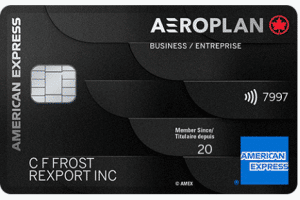
Good for: premium travel benefits
- Annual Fee: $599
- Interest Rates: 19.99%/21.99%
- Associated Brand: Aeroplan
- Rewards Rates:
- 3x points for every $1 spent on eligible purchases made directly with Air Canada and Air Canada Vacations
- 2x points for every $1 spent on eligible hotels and car rentals
- 1.25x points for every $1 spent on everything else
- Welcome Offer: Up to 120,000 Aeroplan bonus points
- Perks:
- Access more than 1,200 Priority Pass airport lounges around the world
- Access to select Air Canada Maple Leaf Lounges for you and a guest, and Air Canada Café in North America
- Priority Check-In, Priority Boarding, and Priority Baggage Handling when you fly with Air Canada
- Receive one Annual Worldwide Companion Pass when you spend $25,000 in net purchases prior to your Card anniversary date
- Receive up to $100 CAD in statement credits every four years when NEXUS application or renewal fees are charged to your card
- Access to Pearson Priority Security Lane, Complimentary Valet Service, 15% discount on parking rates, and 15% discount on Car Care Services at YYZ
- Enjoy priority access to the standby list and eUpgrades
- Insurance:
- $100,000 employee card misuse protection
- 90 days of purchase security and up to one additional year of extended warranty protection
- $5 million in emergency travel medical insurance and $500,000 in travel accident insurance
- $1,000 for flight and baggage delays, lost or stolen luggage and hotel burglary
- $3,000 for trip cancellation and $6,000 for trip interruption for all insured persons combined
- Eligibility: No minimum income requirement
American Express Business Edge Card
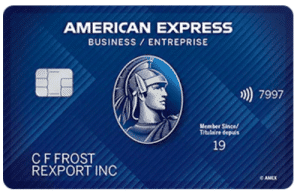
Good for: flexible points usage
- Annual Fee: $99
- Interest Rates: 20.99%/21.99%
- Rewards Rates:
- 10x points for every $1 spent on eligible business spending including office supplies & electronics, rides and gas, eats and drinks within the first 6 months
- 3x points for every $1 spent on office supplies & electronics, rides and gas, eats and drinks when Welcome Bonus Period ends
- 1x points for every $1 spent on everything else
- Welcome Offer: Up to 67,000 bonus points
- Perks:
- Use points to offset business expenses
- Transfer points to airline, hotel and other travel partners for use, including one-to-one to Aeroplan and Avios
- Insurance:
- $100,000 employee card misuse protection
- 90 days of purchase security and up to one additional year of extended warranty protection
- Eligibility: No minimum income requirement
American Express Business Gold Rewards Card
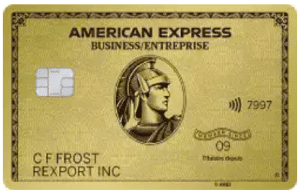
Good for: frequent business travellers
- Annual Fee: $199
- Interest Rates: 20.99%/30%
- Rewards Rates:
- 10,000 points each quarter when you charge $20,000 to your card
- 1x points on $1 spent on everything else
- Welcome Offer: Up to 70,000 bonus points
- Perks:
- Use points flexibly, for flights, hotels, car rentals, Amazon purchases, gifts, merchandise, and to pay off statement balances
- Transfer points to frequent flyer and hotel programs, including one-to-one to Aeroplan and Avios
- Up to 55 interest-free days
- Insurance:
- $100,000 employee card misuse protection
- 90 days of purchase security and up to one additional year of extended warranty protection
- $1,000 per person for theft, loss or accidental damage to eligible mobile devices
- $85,000 in car rental theft and damage insurance
- $500 per person per trip for lost or damaged baggage
- $500 for hotel burglary
- $500 each in flight delay insurance and baggage delay insurance
- Up to $100,000 of accidental death and dismemberment insurance
- Eligibility: No minimum income requirement
American Express Business Platinum Card
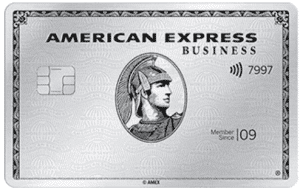
Good for: flexible rewards on business expenses
- Annual Fee: $499
- Interest Rates: 20.99%/30%
- Rewards Rate: 1.25x points for every $1 spent on everything
- Welcome Offer: Up to 90,000 bonus points
- Perks:
- No predetermined spending limit
- 225,000 referral bonus points
- 55 interest-free days on new purchases
- Transfer points to frequent flyer and hotel programs, including one-to-one to Aeroplan and Avios
- Exclusive access to over 1,300 airport lounges for primary cardholders and up to two travel companions
- Premium benefits at Toronto Pearson Airport, including access to the Pearson Priority Security Lane and discount on parking
- Complimentary upgrades and services at participating hotels and resorts
- Flight discounts through the International Airline Program
- Insurance:
- $100,000 employee card misuse protection
- 90 days of purchase security and up to one additional year of warranty protection
- $5 million for travel emergency medical insurance and $500,000 in travel accident insurance
- $1,000 for flight and baggage delays, lost or stolen luggage and hotel burglary
- $3,000 for trip cancellation and $6,000 for trip interruption for all insured persons combined
- $85,000 car rental theft and damage insurance
- One year extended warranty and up to $25,000 for replacement and repairs
- $1,000 for physical damage and theft of purchases
- Eligibility: No minimum income requirement
BMO Air Miles No-Fee Business Mastercard
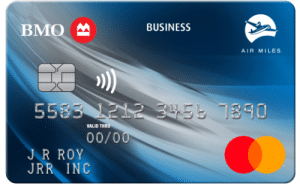
Good for:Â earning Air Miles without paying a fee
- Annual Fee: $0
- Interest Rates: 19.99%/22.99%
- Associated Brand: Air Miles
- Rewards Rates:
- 1 Air Miles Reward Mile on every $20 you spend
- 1.25 Air Miles for every $20 spent at participating Shell stations
- Welcome Bonus: 1,000 Air Miles
- Perks: 25 payment grace days
- Insurance:
- Enrollment in BMO’s Liability Waiver Program that protects businesses against employee card abuse
- 90 days of purchase security and up to one additional year of warranty protection
- Eligibility: No minimum income requirement
BMO Air Miles World Elite Business Mastercard
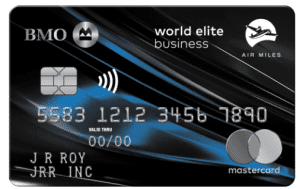
Good for: Air Miles
- Annual Fee: $149
- Interest Rates: 17.99%/22.99%
- Associated Brand: Air Miles
- Rewards Rates:
- 4x points on every $1 spent on gas, office supplies, cell phone and internet bill payments
- 1.5x points on every $1 spent on everything else
- Welcome Offer: Up to 70,000 BMO bonus points
- Perks:
- Annual fees waived for the first year
- Get 4x the Miles when you use your card at participating Air Miles partners
- 25 payment grace days
- Pay 0% interest for 9 months on balance transfers, with a 3% transfer fee
- Membership in Mastercard Travel Pass provided by DragonPass, with two annual lounge passes
- Business owner and co-owner get five free virtual medical visits with Maple
- Insurance:
- Enrollment in BMO’s Liability Waiver Program that protects businesses against employee card abuse
- 90 days of purchase security and up to one additional year of warranty protection
- $500,000 in insurance for travel accidents
- $500 each for flight and baggage delays
- $1,000 for lost or stolen luggage, personal effects, and hotel burglary
- $2,500 for trip cancellation and $2,000 for trip interruption
- $200,000 car rental theft and damage insurance, $1,000 in car rental personal effect theft
- Eligibility: Personal income of $80,000+, household income of $150,000+
BMO CashBack Business Mastercard
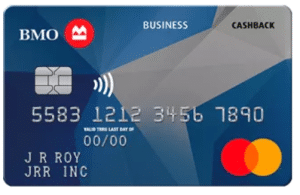
Good for:Â cash back on gas
- Annual Fee: $0
- Interest Rates: 19.99%/22.99%
- Rewards Rates:
- 1.5% cash back on eligible gas stations, office supplies purchases and on eligible recurring bill payments (e.g. cell phone and internet)
- 1.75% cash back on purchases at Shell gas stations
- 0.75% cash back on all other card purchases
- Welcome Offer: Up to $150
- Perks:
- 0.00% introductory interest rate on Balance Transfers for 9 months with a 3% transfer fee
- 25 payment grace days
- Insurance:
- Enrollment in BMO’s Liability Waiver Program that protects businesses against employee card abuse
- 90 days of purchase security and up to one additional year of warranty protection
- Eligibility: No minimum income requirement
Caary Business Mastercard

Good for:Â small businesses
- Annual Fee: $0
- Interest Rate: Variable
- Rewards Rate: 1% cash back on all purchases
- Welcome Bonus: None
- Perks:
- No personal liability or credit checks
- Zero annual or foreign exchange fees
- Integrates with accounting software like QuickBooks and Xero
- Virtual credit cards available
- Insurance: None
- Eligibility:
- Registered as a corporation in Canada (excluding Quebec)
- Maintain a $35,000+ average account balance in a business bank account
- Report a $25,000+ annual spend on a credit card
CIBC Aeroplan Visa Business Card
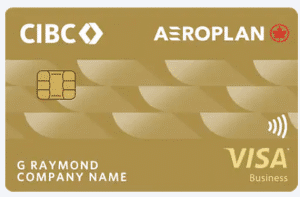
Good for:Â earning Aeroplan points on everyday business expenses
- Annual Fee: $180
- Interest Rates: Variable (12.99%-21.50%)
- Associated Brand: Aeroplan
- Rewards Rates:
- 2x points per $1 spent with Air Canada and Air Canada Vacations
- 1.5x points per $1 spent on shipping, cable, internet, phone services, travel and dining
- 1x points per $1 spent on everything else
- Welcome Offer: Up to 60,000 Aeroplan bonus points
- Perks:
- One-time annual fee rebate for the primary cardholder and up to three authorized users
- Free first checked bag for primary cardholders, authorized users and up to 8 travel companions for all Air Canada flights
- Priority check-in and boarding Aeroplan Flight Rewards operated by Air Canada
- Earn up to 4 Maple Leaf Lounge guest passes per year
- Receive 1,000 status qualifying miles and 1 status qualifying segment for every $5,000 in eligible purchases
- Insurance:
- 90 days of purchase security and up to one additional year of warranty protection
- $500,000 in insurance for travel accidents
- $500 each for flight and baggage delays
- $500 for lost or stolen luggage
- $1,000 for trip cancellation
- $2,000 for trip interruption
- Up to $65,000 in car rental theft and damage insurance
- Eligibility: $35,000 minimum income requirement
CIBC Aeroplan Visa Business Plus Card
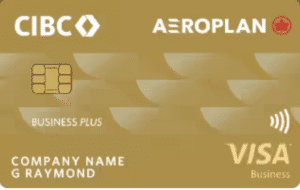
Good for:Â Aeroplan travel perks
- Annual Fee: $120
- Interest Rates: 19.99%/22.99%
- Associated Brand: Aeroplan
- Rewards Rates:
- 2x points per $1 spent with Air Canada and Air Canada Vacations
- 1.5x points per $1 spent on shipping, cable, internet, phone services, travel and dining
- 1x points per $1 spent on everything else
- Welcome Offer: Up to 60,000 Aeroplan bonus points
- Perks:
- One-time annual fee rebate for the primary cardholder and up to three authorized users
- Complimentary Maple Leaf Lounge access for new cardholders
- Free first checked bag for primary cardholders, authorized users and up to 8 travel companions for all Air Canada flights
- Receive an Air Canada Buddy Pass, good for a $0 base fare anywhere Air Canada flies in North America, when $3,000 is charged to the account in the first four monthly statement periods
- Preferred pricing on Air Canada flights booked using Aeroplan Points
- Priority check-in and boarding Aeroplan Flight Rewards operated by Air Canada
- Earn up to 4 Maple Leaf Lounge guest passes per year
- Receive 1,000 status qualifying miles and 1 status qualifying segment for every $5,000 in eligible purchases
- Free Uber Pass for six months
- Insurance:
- 90 days of purchase security and up to one additional year of warranty protection
- $500,000 in insurance for travel accidents
- $500 each for flight and baggage delays
- $500 for lost or stolen luggage
- $1,000 for trip cancellation
- $2,000 for trip interruption
- Up to $65,000 in car rental theft and damage insurance
- Eligibility: $35,000 minimum income requirement
CIBC Aventura Visa Card for Business

Good for:Â earning points for travel
- Annual Fee: $120
- Interest Rates: 19.99%/21.99%
- Rewards Rates:
- 2x points for every $1 spent on all travel purchases made through the CIBC Rewards Centre
- 1.5x points for every $1 spent on gas, electric vehicle charging, transit and travel spending
- 1x points for every $1 spent on everything else
- Welcome Offer: Up to 60,000 bonus points
- Perks:
- The first year is free for the primary cardholder and up to 3 supplementary cards
- Get a one-time $120 travel credit when you book travel through the CIBC Rewards Centre
- Insurance:
- 90 days of purchase security and up to one additional year of warranty protection
- $500,000 in insurance for travel accidents
- $500 each for flight and baggage delays
- $1,000 for trip cancellation
- $2,000 for trip interruption
- Up to $65,000 in car rental theft and damage insurance
- Eligibility: $35,000 minimum income requirement
CIBC Aventura Visa Card for Business Plus
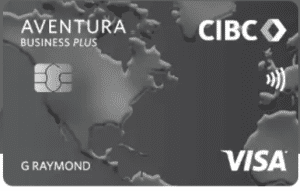
Good for:Â pooling points between accounts
- Annual Fee: $120
- Interest Rates: 19.99%/22.99%
- Rewards Rates:
- 2x points for every $1 spent on all travel purchases made through the CIBC Rewards Centre
- 1.5x points for every $1 spent on gas, electric vehicle charging, transit and travel spending
- 1x points for every $1 spent on everything else
- Welcome Offer: Up to 60,000 bonus points
- Perks:
- The first year is free for the primary cardholder and up to 3 supplementary cards
- Get a one-time $120 travel credit when you book travel through the CIBC Rewards Centre
- Pool Aventura points between personal and business accounts for maximum efficiency
- Insurance:
- 90 days of purchase security and up to one additional year of warranty protection
- $500,000 in insurance for travel accidents
- $500 each for flight and baggage delays
- $1,000 for trip cancellation
- $2,000 for trip interruption
- Up to $65,000 in car rental theft and damage insurance
- Eligibility: $35,000 minimum income requirement
CIBC Bizline Visa Card for Small Business
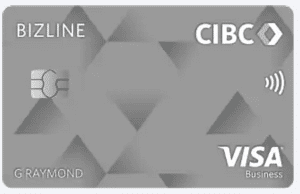
Good for:Â low interest rate
- Annual Fee: $0
- Interest Rate: 8.45%-19.95%
- Rewards Rate: No rewards
- Welcome Bonus: None
- Perks: None
- Insurance: Up to $100,000 in insurance for travel accidents
- Eligibility: $35,000 minimum income requirement
Desjardins Business Visa Card
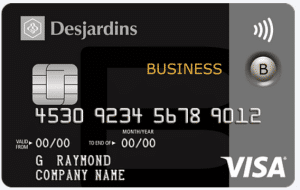
Good for:Â low interest rates
- Annual Fee: $60
- Interest Rate: 15.45%
- Rewards Rate: 1% cash back on all purchases between $12,000 and $500,000 spent annually
- Welcome Bonus: None
- Perks:
- Free access to lawyers for corporate legal assistance and information security services
- Discounts up to 20% at Hertz locations worldwide
- 8% discount on annual insurance premiums for any commercial vehicles on Desjardins Business Insurance
- Same interest rate for purchases and cash advances
- Insurance:
- Up to $100,000 in insurance for travel accidents
- Car rental theft and damage insurance
- Eligibility: No minimum income requirement
Desjardins Visa US Business card
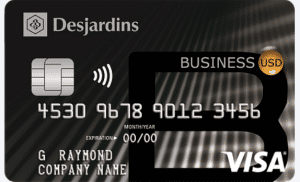
Good for:Â
- Annual Fee: $30 USD
- Interest Rate: 19.4%
- Rewards Rate: None
- Welcome Bonus: None
- Perks:
- USD transactions with no foreign transaction fees
- Travel insurance included when traveling for business purposes
- Same interest rate for purchases and cash advances
- Insurance:
- Up to $100,000 in insurance for travel accidents
- Baggage delay insurance up to $200
- Lost or stolen baggage coverage up to $500
- Eligibility: No minimum income requirement
Loop Corporate Mastercard
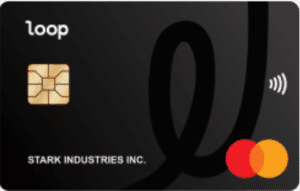
Good for:Â multi-currency transactions
- Annual Fee: $0
- Interest Rate: 2.99%
- Rewards Rate: 1x points for every $1 spent
- Welcome Bonus: None
- Perks:
- No foreign transaction fees or foreign exchange fees for transactions in USD, CAD, GBP and EUR
- Virtual cards available
- 55 days of interest-free purchases
- Same interest rate for purchases and cash advances
- Insurance: None
- Eligibility: No minimum income requirement
Float Visa Card
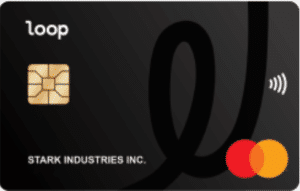
Good for:Â small businesses without a credit history
- Annual Fee: $0
- Interest Rate: n/a
- Rewards Rate: 1% cash back on every $1 spent
- Welcome Offer: Up to $500
- Perks:
- Prepaid card requiring no credit checks or interest payments
- Software and bookkeeping integrations
- Virtual cards
- Insurance: None
- Eligibility: None
Marriott Bonvoy Business American Express Card
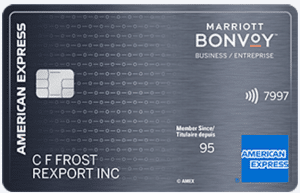
Good for:Â hotel rewards
- Annual Fee: $150
- Interest Rates: 20.99%/21.99%
- Associated Brand: Marriott
- Rewards Rates:
- 5x points for every $1 spent at participating Marriott Bonvoy hotels
- 3x points for every $1 spent on eligible gas, dining and travel
- 2x points for every $1 spent on everything else
- Welcome Offer: Up to 85,000 bonus points
- Perks:
- Redeem points for free nights with no blackout dates at over 7,000 hotels worldwide
- Receive an Annual Free Night Award automatically each year after your anniversary
- Receive 15 Elite Night Credits each calendar year
- Insurance:
- 90 days of purchase security and up to one additional year of warranty protection
- $500,000 in insurance for travel accidents
- $500 each for flight delays, baggage delays, lost or stolen luggage, and hotel burglary
- Car rental theft and damage insurance
- $1,000 in mobile device coverage
- Eligibility: No minimum income requirement
Meridian Visa Infinite Business Cash Back Plus Card
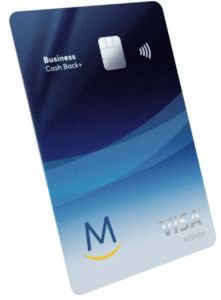
Good for:Â credit union customers
- Annual Fee: $110
- Interest Rate: 19.5%
- Rewards Rates:
- 1.5% unlimited cash back on all purchases
- 3% unlimited cash back on net purchases in foreign currencies
- Same interest rate for purchases and cash advances
- Welcome Bonus: None
- Perks:
- Annual fee rebate for the first year
- Access to Visa Infinite Benefits, which include concierge services and access to luxury hotels, dining events and wine tastings
- Insurance:
- $1,000 in mobile device coverage
- 90 days of purchase security up to $10,000 per item and $50,000 per account, and up to one additional year of warranty protection
- Price protection coverage within 60 days of a purchase, up to $500
- $1,000 in trip cancellation insurance
- $1,000 in trip interruption insurance
- $1,000 in lost, stolen and damaged baggage insurance
- $1 million in insurance for travel accidents
- Rental car insurance
- Eligibility: Member of Meridian
RBC Avion Visa Infinite Business
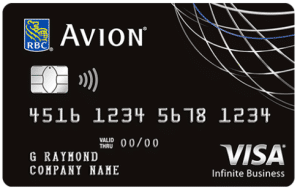
Good for:Â Avion points
- Annual Fee: $175
- Interest Rates: 20.99%/22.99%
- Associated Brand: Avion
- Rewards Rates:
- 1.25x points for every $1 spent in net purchases on up to $75,000 every year
- 1x points for every $1 spent after that
- Welcome Offer: Up to 25,000 bonus points
- Perks:
- Points can be redeemed for flights, hotel stays, vacation packages, cruises, merchandise, gift cards and RBC Financial Rewards vouchers, or used to pay down credit card balances
- Points earned on employees’ Avion Visa Infinite Business cards can be combined with those earned through a business owner’s business and personal Avion cards
- Access to dining, entertainment and other experiences
- Access to more than 1,300 airport lounges and airport dining and spa offers
- Access to Visa Infinite Business Concierge to help plan business travel by booking event tickets, making restaurant reservations and locating hard-to-find items.
- Up to 30% off base rates on car rentals, and earn three times the points at Hertz locations
- $0 delivery fees for 12 months from DoorDash
- Save 3 cents per litre on fuel at Petro-Canada and earn 20% bonus Petro Points
- Free membership with Priority Pass
- Insurance:
- 90 days of purchase security and up to one additional year of warranty protection
- $2,000 in mobile device insurance
- $500,000 in insurance for travel accidents
- 15 days of emergency medical care (3 days for over 65s)
- $500 each for flight and baggage delays
- $1,500 for trip cancellation
- $5,000 for trip interruption
- $1,000 for lost or stolen baggage
- $2,500 for hotel burglary
- Up to $65,000 in car rental theft and damage insurance
- Eligibility: Personal income of $60,000+, household income of $100,000+
RBC Business Cash Back Mastercard
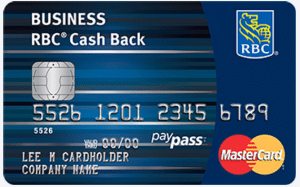
Good for:Â cash back
- Annual Fee: $0
- Interest Rates: 20.99%/22.99%
- Rewards Rates:
- 2% cash back on purchases made in the first three months
- 1% cash back on purchases made after three months (up to an annual limit of $650)
- Welcome Bonus: None
- Perks:
- Automatic enrolment in Mastercard’s Easy Savings Program, which provides rebates on products and services from participating merchants
- Linked cards save 3 cents per litre on fuel and 20% more Petro-Points at Petro-Canada locations
- $0 delivery fees for 3 months from DoorDash
- Access to the RBC Offers program, which provides cash savings or bonus points on business spending at brands like Apple, ADP and Telus
- Insurance: 90 days of purchase security and up to one additional year of warranty protection
- Eligibility: No minimum income requirement
Scotia Momentum for Business Visa Card
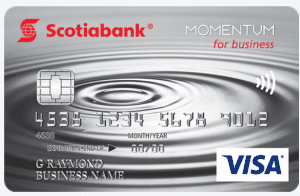
Good for:Â balance transfers
- Annual Fee: $79
- Interest Rates: 19.99%/22.99%
- Rewards Rates:
- 3% cash back on recurring bill payments and eligible gas station, restaurant expenses and office supplies purchases (up to a maximum spend of $50,000)
- 1% cash back on all purchases after $50,000
- Welcome Bonus: 2.99% interest on balance transfers for 6 months
- Perks:
- Rewards can be redeemed as deposits into eligible Scotiabank Canadian Dollar bank accounts or as credits against credit card balances
- Save up to 25% off base rates on car rentals at participating Avis and Budget locations in Canada or the U.S.
- Use Visa SavingsEdge to receive discounts on business purchases at participating stores
- Insurance:
- Optional Scotia Business Loan Protection coverage up to $2,000,000
- 90 days of purchase security and up to one additional year of warranty protection
- Emergency medical term coverage for 8 days (3 days for over 65s)
- Car rental damage and theft insurance
- Eligibility: No minimum income requirements
Scotiabank Passport Visa Infinite Business Card
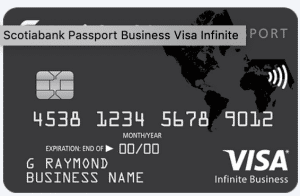
Good for:Â no fee foreign transactions
- Annual Fee: $199
- Interest Rates: 19.99%/22.99%
- Associated Brand: Scene
- Rewards Rate: 1.5 Scene points for every $1 spent
- Welcome Offer: Up to 30,000 Scene bonus points
- Perks:
- Additional 10,000 bonus Scene points when you spend $60,000 in the first year
- No foreign transaction fees
- Priority Pass membership with 6 free passes
- Avis Preferred Plus membership
- Access to Visa Infinite Concierge service and Luxury Hotel Collection
- $10,000 credit limit minimum, up to $150,000 unsecured credit limit
- Insurance:
- 90 days of purchase security and up to one additional year of warranty protection
- $500,000 in insurance for travel accidents
- 25 days of emergency medical care (10 days for over 65s)
- $500 flight delays
- $1,000 for baggage delays
- $1,000 for lost or stolen baggage
- $1,000 for hotel burglary
- $2,500 for trip cancellation
- $2,500 for trip interruption
- Car rental theft and damage insurance
- Eligibility: Personal income of $60,000+, household income of $100,000+
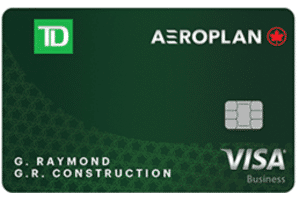
TD Aeroplan Visa Business Card
Good for:Â Aeroplan points and travel perks
- Annual Fee: $149
- Interest Rates: 14.99%/22.99%
- Associated Brand: Aeroplan
- Rewards Rates:
- 2x Aeroplan points for every $1 spent on eligible purchases made directly with Air Canada and Air Canada Vacations
- 1.5x Aeroplan points for every $1 spent on eligible travel, dining and select business categories, such as shipping, internet, cable and phone services
- 1x Aeroplan point for every $1 spent on all other eligible purchases
- Welcome Offer: Up to 50,000 bonus points
- Perks:
- Points can be redeemed for flights, hotels, merchandise, gift cards, and to pay down the TD Aeroplan Visa Business Card balance
- Linked cards earn 50% more Aeroplan points and Stars at participating Starbucks stores
- Annual fee rebated in the first year
- Free first checked bag for up to 9 people travelling on the same reservation on Air Canada flights
- One free one-time guest pass to Maple Leaf Lounges for every $10,000 in net purchases
- 1,000 Status Qualifying Miles and one Status Qualifying Segment for every $5,000 in net purchases
- Access to Visa SavingsEdge program and save up to 25% on eligible business purchases
- Toll-free emergency travel assistance services
- Receive a rebate of up to $100 on NEXUS enrolment application/renewal fee costs once every 48 months
- Save a minimum of 10% on the lowest available base rates in Canada and the U.S., and a minimum of 5% on the lowest base rates internationally on qualifying car rentals at participating Avis and Budget locations
- Insurance:
- 90 days of purchase security and up to one additional year of warranty protection
- Mobile device insurance up to $1,000
- $500,000 in insurance for travel accidents
- 15 days of travel medical insurance (4 days for over 65s) up to $2 million
- $500 flight delays
- $1,000 for baggage delays
- $1,000 for lost or stolen baggage
- $2,500 for hotel burglary
- $1,500 for trip cancellation
- $5,000 for trip interruption
- Car rental theft and damage insurance
- Eligibility: No minimum income requirement
TD Business Travel Visa Card
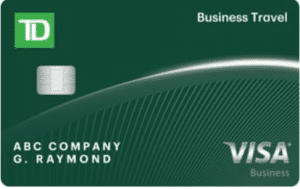
Good for:Â quickly earning points on travel
- Annual Fee: $149
- Interest Rates: 19.99%/22.99%
- Rewards Rates:
- 9x points when you book travel online through ExpediaForTD.com using your Card
- 6x points for every dollar spent on foreign currency purchases, restaurant purchases and regularly recurring bill payments up to a maximum annual spend of $80,000
- 2x points per $1 spent after that
- Welcome Offer: Up to 140,000 bonus points
- Perks:
- Points can be redeemed for flights, hotels, retail business merchandise, gift cards, on Amazon, or used to pay down the card’s balance
- No travel blackouts, no seat restrictions and no expiry for points
- Annual fee for primary cardholder and three additional cards rebated for the first year
- Access Visa SavingsEdge program to save up to 25% on eligible business purchases
- Toll-free emergency travel assistance services
- Save a minimum of 10% on the lowest available base rates in Canada and the U.S., and a minimum of 5% on the lowest base rates internationally on qualifying car rentals at participating Avis and Budget locations
- Access to $5,000 emergency cash advances
- Linked cards can earn 50% more TD Rewards Points and 50% more Stars at participating Starbucks stores
- Insurance:
- 90 days of purchase security and up to one additional year of warranty protection
- $500,000 in insurance for travel accidents
- 15 days of travel medical insurance (4 days for over 65s) up to $2 million
- $500 flight delays
- $1,000 for baggage delays
- $1,000 for lost or stolen baggage
- $1,500 for trip cancellation
- $5,000 for trip interruption
- Car rental theft and damage insurance
- Eligibility: No minimum income requirement
Frequently Asked Questions About Business and Corporate Credit Cards
Can I use my personal credit card for business expenses?
Yes, but it's often inconvenient and inefficient to do so. Using the right business credit card will allow for easier expense tracking, more rewards, and better risk protection than a personal credit card.
Who can get a business credit card in Canada?
Most businesses in Canada will qualify for a business credit card, and there are quite a few to choose from. To be eligible, a business must be actively operating in Canada, the cardholder must be legally resident in Canada, and some cards have income, credit or other financial requirements as well.
How can I get a business credit card in Canada?
Applying for a business credit card has never been easier thanks to online applications. You can search for the best business credit cards, compare rewards and perks, and learn about each card's eligibility rules on the page above.
When you have chosen the best business credit card for your needs, you can follow the link to its online application form.
How many business credit cards are there in Canada?
There are nearly 30 business credit cards currently available in Canada, and each has its own set of characteristics and benefits. Just as with a personal credit card, finding the best business credit card depends on what you need it for and how you'll use it.
How do I find the right business credit card for me?
The best business credit cards all offer a different range of perks and rewards, and come at a range of costs, so finding the right one for you depends entirely on what you need it for and how you'll use it.
For example, is expense management the most important factor in your decision to get a business card? If so, you'll want to prioritize cards that offer tools to help in this area.
Or maybe you know you'll use the card for cash advances more than anything else - in which case, a competitive interest rate on cash advances may matter more. Maybe the card is intended for office supplies and sundries, and a card that provides high rewards for common business expenses is the best bet.
There is a card for every situation and need, so finding the best business credit card is a matter of perspective.
Do business credit cards have high limits?
Business credit cards tend to have higher credit thresholds than personal credit cards; the average consumer card has a limit of just over $31,000, while the average small business card has a limit of just over $56,000.
Business cards that offer credit up to $100,000 are common, but you should know that every applicant's situation is assessed to determine the appropriate limit for them. In addition, there are limits for cash advances separate from the overall spending limit.
Do business credit cards need credit checks?
Most business credit cards in Canada require a credit check. This can either be a business credit check, or a personal credit check (or both), depending on the card in question and the applicant's details.
For example, a small business credit card is more likely to require a personal credit check, as the fate of the business will be tied to the fate of the business owner. The same is true for new businesses. Larger or more established ventures are more likely to rely on business credit history for their credit applications.
Do banks check personal credit for business credit cards?
Yes, sometimes. This depends on the requirements of the business credit card being applied for, as well as the situation of the applicant business and cardholder.
Does business credit affect personal credit in Canada?
Only if business expenses and personal expenses become intertwined, or if you do not make your credit card payments appropriately. Making late payments, missing payments or defaulting on a business credit card that you are responsible for will negatively affect your personal credit, even if you have a good credit history in your personal life.
Can I get a business credit card with a low credit score?
Possibly, although it will be harder. There are business credit cards in Canada available to those with poor credit (or no credit), but they will usually have a much pre set spending limit, lower rewards per dollar spent, and possibly higher fees.
How quickly can I get a business credit card?
That depends on how you apply and your application details, but some business credit cards can be issued as quickly as within 1-2 days of application, and some may take 1-2 weeks.
To speed up the process, opt for cards with online application processes and instant approval, and make sure you supply all of the required information in your application.
What is a corporate credit card?
A corporate credit card is a type of business credit card intended for use by registered corporations - large companies with established credit records and millions in revenues.
What is the difference between a corporate card and a business card?
Although corporate credit cards and business credit cards effectively work the same, a corporate card is intended for use by a big corporation, and a small business credit card is intended for use by a small to medium sized business.
Corporate cards have higher limits, more rewards, and cost more, while small business credit cards offer perks more relevant to their needs - for example, business management tools included with the card, cash back on eligible purchases, and so on.
Can you use a corporate card for personal use?
Using a company credit card for personal expenses may sometimes be unavoidable, and legally, a cardholder may use a card in their name in any way they like.
However, if you have been issued a company card, it is likely your employer has strict rules around how it can be used, and so you should be wary of making a purchase that could potentially violate your terms of service and may cause unforeseen problems.
Does a corporate credit card affect my personal credit score?
Corporate credit cards are used by large organizations to help streamline expense management, and in most cases the details of the cards issued to corporations depend on the corporation itself (its revenue, size, credit history, and so on) rather than the cardholder. This is because it is the corporation who will be responsible for paying the card's fees and balances. However, it is possible that a card issuer may check a person's personal credit score before giving them a card.
Which business credit card offers expense management tools?
Almost every available business card offers some form of expense or business management tool, so a more relevant question may be: which tool is the best?
For example, TD business credit cards offer access to the TD card management tool, and RBC cards offer access to the RBC card management tool. So it becomes necessary to understand what each expense management tool offers and which will be the most useful for you. You may not want to choose one of the TD business credit cards if their associated tool does not work in the way that you need.
Which is the best credit card for business purchases?
Many of Canada's best business credit cards offer rewards for business expenses and other eligible purchases made on the card, so finding the best business credit card for you may come down to the details on how these rewards are earned and received.
For example, one rewards business credit card may offer 3x points spent on office supplies and other similar business expenses, while a competitor offers 2.5x rewards on the same set of eligible purchases. But this second card may come with a welcome bonus that far offsets its lower rewards earn rate. Or, one card may have a limit on how many points can be earned in a monthly billing period, effectively capping its usefulness.
For this reason, finding the best credit card for everyday business purchases depends on how many card purchases you expect to make, any welcome bonus offered, other expected uses of the business card, and so on. There are many ways to save money with business credit cards in Canada, so don't assume the best business credit card is the one with the highest rewards rate per dollar spent.
Explore more
Why Choose Smarter Loans?

Access to Over 50 Lenders in One Place

Transparency in Rates & Terms

100% Free to Use

Apply Once & Get Multiple Offers

Save Time & Money

Expert Tips and Advice















